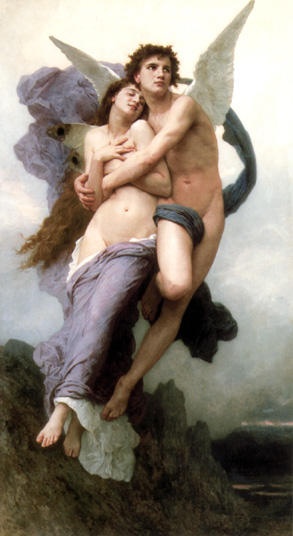

A Critical Look at the War between True Love and Passion throughout Literature
"What is love?"
The perennial question echoes through the corridors of time, with answers just as varied. From Aristophanes' claim that all people are spheres cut in twain looking for his or her other half (Plato, Symposium 157-158), to Freud's assertion that all love is purely sexual (Freud, New Introductory Lectures on Psycho-Analysis), men have puzzled over this greatest passion and virtue in an attempt to pin down the wingéd Cupid.
But where is the line between that passion and that virtue? Can both be constituted under the title Love who has been described by all alike as "the eldest and noblest and mightiest of the gods (Plato 153)"? And if one accepts that "Love bears all things, believes all things, hopes all things, endures all things (1 Cor. 13:7)," in short that Love is total self-giving, then how could passion and desire, which is essentially self-satisfying, be a part of true Love?
Too many banal readers, however, have perpetuated this clerical error, preferring a doctrine of gain over the Christian doctrine of giving. So from the philosophers to the poets the dilemma falls. Theirs is the task to show the final effect of the destructive power of possessive desire, and by means of a medium on one level gratuitous, to bring the audience back to the truth of Love.
The earliest literary example of this destructive desire is in Homer's Iliad. The first immortal lines "Sing, O goddess, the anger of Achilles, son of Peleus, that brought countless ills upon the Achæans (Homer 3)." The reason why Achilles is enraged is because Agamemnon ("most noble son of Atreus, covetous beyond all mankind [Homer 4]") is forced to give up his concubine Chryseis to her father and so takes Achilles' Briseis. Because of this, Achilles refuses to fight, instead allowing the Greek army to suffer massive destruction. The spat between Achilles and Agamemnon is, of course, a mere microcosm of the entire Trojan War that was first caused by the possessive love of Helen by Paris.
Euripedes' plays Medea and Phaedra, like the Iliad, graphically represent the destructive quality of possessive desire. In the former, Medea, enraged that Jason has left her in order to possess the daughter of the King of Corinth, destroys Jason by destroying everything around him: his new wife, the King and his two sons. If Medea cannot possess Jason, then Jason will possess nothing. In a lucid moment, Medea sums up the nature of possessive desire with the line, "At last I understand the awful deed I am to do; but passion, that cause of direst woes to mortal man, hath triumphed o'er my sober thoughts (Euripedes 221)." Similarly in Phaedra, the title character's overwhelming desire for her stepson results in her suicide and his subsequent, undeserved death. In this case, if Phaedra could not possess her perceived good, her life and his must be forfeit.
The story of Dido in Virgil's Æneid, Book IV, is another example of this misplaced desire. In this story, Æneas is enticed to desert his fate to found Rome and remain with Dido. Only the intercession of Jove, by way of Hermes, can deter the hero from allowing himself to be lured into marriage with the Queen. The possessive quality is aptly show from Hermes first few words: "Degenerate man,/Thou woman's property (Virgil 166)," and is affirmed by Dido's closing plea: "Had you deferr'd, at least, your hasty flight,/And left behind some pledge of our delight,/ Some babe to bless the mother's mournful sight,/Some young Æneas, to supply your place,/Whose features might express his father's face;/I should not then complain to be left bereft/Of all my husband, or be wholly left (Virgil 168)." In this particular case, Dido's "love" is willing to compromise for an alternate Æneas, whom she will be able to possess more fully by rearing him to her satisfaction. When even this is denied her, though, Dido takes the route of Phaedra and so many other predecessors by burning herself. But as Dido's sister laments, the Queen's death was not a solitary destruction: "At one thou hast destroy'd thyself and me,/Thy town, thy senate, and thy colony (Virgil 181)!"
Dante brings us back to the world of the Æneid in his Divine Comedy. Virgil is his guide through the Inferno and the Purgatorio, while Love guides him through the Paradisio. In the fifth canto, the second ring of the Inferno, Dante places the sexually incontinent-those who gave into their desire to possess what they believed to be good. Among those whirled about by the black winds are Semiramis, Ninus, Cleopatra, Dido, Helen, Achilles, Paris and thousands more (Dante 99). In this masterpiece of Christian literature, the reader is allowed to see the immortal destruction of a soul given over to unbridled passion as opposed to the physical or social destruction.
Milton's Paradise Lost puts into poetry the root of this perverted love, this possessive desire. Book IX is the act of the Fall itself, when Lucifer disguised as the serpent, convinces Eve to take from the forbidden Tree of the Knowledge of Good and Evil a fruit to eat. Eve sees the tree and perceives it to be "good for food…a delight to the eyes (Gen. 3:6)." Milton writes: "her rash hand in evil hour/Forth reaching to the Fruit, she pluck'd, she eat:/Earth felt the wound, and Nature from her seat/Sighing…/That all was lost (Milton 264)." Eve's eating the fruit is grossly described in words that suggest a sexual possessive union: "Greedily she ingorg'd without restraint,/And knew not eating Death (Milton 264)" As soon as she is done with the fruit, we see the change in her from one who truly loves the other in a self-sacrificial manner (she took the fruit so that they might share the benefits of the tree) to one who desires dominion over her partner: "so to add what wants/In Femal Sex, the more to draw his Love,/And render me more equal, and perhaps,/A thing not undesirable, somtime/Superior: for if inferior who is free (Milton 265)?" Adam in a spirit of true but juvenile love, agrees to eat the fruit, and earth groans again. Their sin, our Original Sin, the sin of unchecked desire for possession of the perceived good, caused the dual destruction of our soul and body, and the world. This sin also began that confusion and perversion of Love itself, as Milton expresses: "Carnal desire enflaming, hee on Eve/Began to cast lascivious Eyes, she him/As wantonly repaid; in Lust they burne (Milton 269)."
Tolstoy's Anna Karenina returns us to the Grecian tradition of story-telling by weaving a tale of destruction-both physically and spiritually-in the modern world. The novel opens with the line, "Happy families are all alike; every unhappy family is unhappy in its own way (Tolstoy 1)."
True Love is not the possession of another for the gaining of the perceived good or beauty that the other has. Love is a self-giving, perfectly achieved by God's gifts to us (John 3:16). While possessive desire inevitably ends in a form of death, the ultimate destruction, self-giving Love ends in eternal life. As Phaedrus says in the Symposium, "Love will make men dare to die for their beloved-love alone; and women as well as men (Plato 152)," so we must dare to live for the beloved, in order to give our goodness and beauty to our loved one without expecting the same in return.
And as for desire? Are we, like the gnostics or the Puritans, to believe that all desires are evil? Does desire have no place in true Love? Or is it rather that the desire for the beloved is pure and a prelude to the blossoming of Love, while desire for possession or dominion over the beloved is the perversion. One need only look at the Song of Songs to answer this question:
Through poetry, man may see the death that comes from possessive desire.
Through grace, man may live true Love.
1. Dante. The Divine Comedy: Inferno. Trans. Dorothy Sayers. (England: Penguin Books, © 1949.)
2. Euripides. "Medea." Trans. Edward P. Coleridge. Aeschylus, Sophocles, Euripides, Aristophanes. (Chicago: Encyclopedia Britannica, Inc., © 1952.)
3. God. Ignatius Bible. Imprimatur Bishop Peter W. Bartholome. (United States of America: Ignatius Press, © 1966.)
4. Homer. "The Iliad." Trans. Samuel Butler. The Iliad of Homer and The Odyssey. (Chicago: Encyclopedia Britannica, Inc., © 1952.)
5. Milton. "Paradise Lost." John Milton. (Chicago: Encyclopedia Britannica, Inc., © 1952.)
6. Plato. "Symposium." Plato. Trans. Benjamin Jowett. (Chicago: Encyclopedia Britannica, Inc., © 1952.)
7. Tolstoy, Leo. Anna Karenina. Trans. Joel Carmichael. (United States of America: Bantam Books, © 1960.)
8. Virgil. The Æneid. Trans. John Dryden. (New York: P.F. Collier & Son, © 1909.)
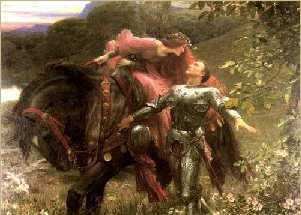 In Plato's Symposium, Socrates describes love as "the love of the everlasting possession of the good (Plato 165 )."
In Plato's Symposium, Socrates describes love as "the love of the everlasting possession of the good (Plato 165 )." 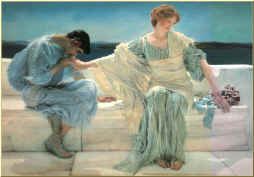 This catastrophic desire for possession is contrasted by Hector's self-sacrificing love for his family and his people. Rightfully, then, Homer ends the Iliad with a tribute to him who loved more perfectly: "Thus, then, did they celebrate the funeral of Hector tamer of horses (Homer 179)."
This catastrophic desire for possession is contrasted by Hector's self-sacrificing love for his family and his people. Rightfully, then, Homer ends the Iliad with a tribute to him who loved more perfectly: "Thus, then, did they celebrate the funeral of Hector tamer of horses (Homer 179)."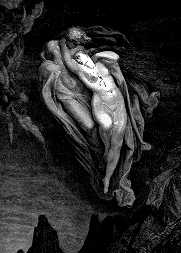 In this circle is told the story of Paolo and Francesca who, while reading about the destructive relationship of Lancelot and Guinevere, fell into that same sin, and were caught and slain by Francesca's husband. Dante shows the truest destruction of "love" for one's own gain: the very essence of these two lovers has been perverted by their mutual self-satisfying sin. Francesca willingly relates the shameful story while Paolo, who should have been speaking, can do no more than wail (Dante 100-101).
In this circle is told the story of Paolo and Francesca who, while reading about the destructive relationship of Lancelot and Guinevere, fell into that same sin, and were caught and slain by Francesca's husband. Dante shows the truest destruction of "love" for one's own gain: the very essence of these two lovers has been perverted by their mutual self-satisfying sin. Francesca willingly relates the shameful story while Paolo, who should have been speaking, can do no more than wail (Dante 100-101).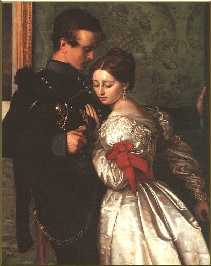 This leads the reader into a brief account of the infidelity of Oblonsky who, through his desire to possess the governess, brought ruin and shame upon his household. Like the Iliad, this is just a microcosm of the title thrust of the story: Anna's own infidelity that leads, Didoesque, to her destruction beneath the train. The interior destruction begins as soon as they take their illicit "pleasure" from each other, rather like our first parents' interior destruction had such immediate catastrophic results. "But what he felt was what a murderer must feel looking at the body he has deprived of life. The body he had deprived of life was their love-the first period of their love…. But in spite of all the murderer's horror in the face of the murdered body…the murderer had to make use of what he had gained by the murder (Tolstoy 157)." Their affair continues despite each one's desire to end it. Anna sacrifices her husband, her son and her social connections in order to stay with Vronsky. Finally, when it becomes obvious to her that what they call "love" is no more than a parasitic lifestyle, she decides to commit suicide: " 'Die-then he'll feel sorry, he'll love me, and suffer for me' (Tolstoy 791)." But Anna's death does not end the novel; after trudging through such a depressing and self-destructive relationship, their affair and her demise do not seem to affect anybody. Tolstoy takes the paradigm of the metaphorical death of the person for the death of the soul, and shows us how neither deaths affect a world that is essentially dead or deadened by this destructive possessive desire we commonly call "love." Only Levin finds some goodness worth striving for, and only Levin experiences some marital joy, but like Socrates, that goodness does not come from divine grace, from Love Himself, but from the finite person: "the goodness I have the power to put into it (Tolstoy 868)!"
This leads the reader into a brief account of the infidelity of Oblonsky who, through his desire to possess the governess, brought ruin and shame upon his household. Like the Iliad, this is just a microcosm of the title thrust of the story: Anna's own infidelity that leads, Didoesque, to her destruction beneath the train. The interior destruction begins as soon as they take their illicit "pleasure" from each other, rather like our first parents' interior destruction had such immediate catastrophic results. "But what he felt was what a murderer must feel looking at the body he has deprived of life. The body he had deprived of life was their love-the first period of their love…. But in spite of all the murderer's horror in the face of the murdered body…the murderer had to make use of what he had gained by the murder (Tolstoy 157)." Their affair continues despite each one's desire to end it. Anna sacrifices her husband, her son and her social connections in order to stay with Vronsky. Finally, when it becomes obvious to her that what they call "love" is no more than a parasitic lifestyle, she decides to commit suicide: " 'Die-then he'll feel sorry, he'll love me, and suffer for me' (Tolstoy 791)." But Anna's death does not end the novel; after trudging through such a depressing and self-destructive relationship, their affair and her demise do not seem to affect anybody. Tolstoy takes the paradigm of the metaphorical death of the person for the death of the soul, and shows us how neither deaths affect a world that is essentially dead or deadened by this destructive possessive desire we commonly call "love." Only Levin finds some goodness worth striving for, and only Levin experiences some marital joy, but like Socrates, that goodness does not come from divine grace, from Love Himself, but from the finite person: "the goodness I have the power to put into it (Tolstoy 868)!" "I am my beloved's,/And his desire is for me." The first line of this passage shows the complete surrendering of the lover to the beloved, often seen as the Church's submission to Christ. The second line, then, is Christ's divine desire for His Church. So, as Christ sanctified mankind by His expression of Love, He also redeemed us from that Original Sin which perverted our desire.
"I am my beloved's,/And his desire is for me." The first line of this passage shows the complete surrendering of the lover to the beloved, often seen as the Church's submission to Christ. The second line, then, is Christ's divine desire for His Church. So, as Christ sanctified mankind by His expression of Love, He also redeemed us from that Original Sin which perverted our desire.


 "The Divine Comedy" by Dante Alighieri
"The Divine Comedy" by Dante Alighieri Waiting for Dating - A Courtship Page
Waiting for Dating - A Courtship Page
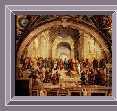

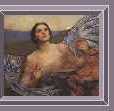
 (c) 9 March 1999
(c) 9 March 1999
Updated 13 June, 2000
All Rights Held by the Author.
No part of these pages may be used or copied without express permission of the author.